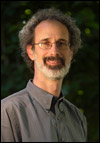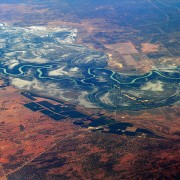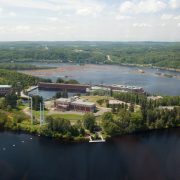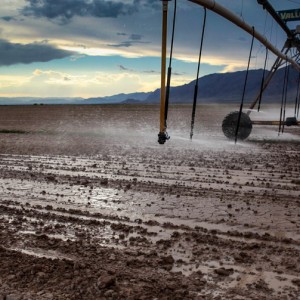Peter Gleick: Climate-change Deniers Versus the Scientific Societies of the World — Who Should we Listen to?
My last post said that climate-change deniers have never produced an alternative scientific theory that adequately explains the compelling evidence of climate change from around the world.
Where should the public, not versed in climate science, look for their information and knowledge about this debate about climate change? Fox News? CNN? The New York Times? PBS? Exxon-Mobil? Environmental groups? This blog (hey, I’ve never argued that)? Senator James Inhofe (who has described human-induced global warming as: “the greatest hoax ever perpetrated on the American people” and “an article of religious faith”)?
How about from the scientists themselves, unfiltered by media or ideologues? Below, find excerpts from the statements of pretty much every single respected, serious, professional scientific society in the world. Go to their websites. All of this stuff is easily available, if you are willing to look. Don’t take my word for it.
The National Science Academies of the G8+5 nations (Brazil, Canada, China, France, Germany, Italy, India, Japan, Mexico, Russia, South Africa, the United Kingdom, and the United States).
It is unequivocal that the climate is changing, and it is very likely that this is predominantly caused by the increasing human interference with the atmosphere. These changes will transform the environmental conditions on Earth unless counter-measures are taken.
American Association for the Advancement of Science (AAAS) Policy Statement on Climate Changes
The scientific evidence is clear: global climate change caused by human activities is occurring now, and it is a growing threat to society. Accumulating data from across the globe reveal a wide array of effects: rapidly melting glaciers, destabilization of major ice sheets, increases in extreme weather, rising sea level, shifts in species ranges, and more. The pace of change and the evidence of harm have increased markedly over the last five years. The time to control greenhouse gas emissions is now.
American Geophysical Union Position Paper on Climate Change
The Earth’s climate is now clearly out of balance and is warming. Many components of the climate system — including the temperatures of the atmosphere, land and ocean, the extent of sea ice and mountain glaciers, the sea level, the distribution of precipitation, and the length of seasons — are now changing at rates and in patterns that are not natural and are best explained by the increased atmospheric abundances of greenhouse gases and aerosols generated by human activity during the 20th century. … Evidence from most oceans and all continents except Antarctica shows warming attributable to human activities…With such projections, there are many sources of scientific uncertainty, but none are known that could make the impact of climate change inconsequential. With climate change, as with ozone depletion, the human footprint on Earth is apparent.
The Geological Society of American Position Paper on Climate Change
The Geological Society of America (GSA) supports the scientific conclusions that Earth’s climate is changing; the climate changes are due in part to human activities; and the probable consequences of the climate changes will be significant and blind to geopolitical boundaries. Furthermore, the potential implications of global climate change and the time scale over which such changes will likely occur require active, effective, long-term planning.
The Ecological Society of America
The Earth is warming — average global temperatures have increased by 0.74 deg. C (1.3 deg. F) in the past 100 years. The scientific community agrees that catastrophic and possibly irreversible environmental change will occur if average global temperatures rise an additional 2 deg. C. Warming to date has already had significant impacts on the Earth and its ecosystems… Most warming seen since the mid 1900s is very likely due to greenhouse gas emissions from human activities.
American Chemical Society
Careful and comprehensive scientific assessments have clearly demonstrated that the Earth’s climate system is changing rapidly in response to growing atmospheric burdens of greenhouse gases and absorbing aerosol particles. There is very little room for doubt that observed climate trends are due to human activities. The threats are serious and action is urgently needed to mitigate the risks of climate change… The costs of unchecked climate change in economic loss, human misery, and loss of ecosystem services are likely to be enormous.
American Physical Society
Emissions of greenhouse gases from human activities are changing the atmosphere in ways that affect the Earth’s climate… The evidence is incontrovertible: Global warming is occurring. If no mitigating actions are taken, significant disruptions in the Earth’s physical and ecological systems, social systems, security and human health are likely to occur. We must reduce emissions of greenhouse gases beginning now.
International Council of Academies of Engineering and Technological Sciences
…most of the observed global warming since the mid-20th century is very likely due to human-produced emission of greenhouse gases and this warming will continue unabated if present anthropogenic emissions continue or, worse, expand without control. CAETS, therefore, endorses the many recent calls to decrease and control greenhouse gas emissions to an acceptable level as quickly as possible.
Network of African Science Academies
[The thirteen signatories were the science academies of Cameroon, Ghana, Kenya, Madagascar, Nigeria, Senegal, South Africa, Sudan, Tanzania, Uganda, Zambia, Zimbabwe, as well as the African Academy of Sciences.]
A consensus, based on current evidence, now exists within the global scientific community that human activities are the main source of climate change and that the burning of fossil fuels is largely responsible for driving this change. The IPCC should be congratulated for the contribution it has made to public understanding of the nexus that exists between energy, climate and sustainability.
European Physical Society
The emission of anthropogenic greenhouse gases, among which carbon dioxide is the main contributor, has amplified the natural greenhouse effect and led to global warming. The main contribution stems from burning fossil fuels. A further increase will have decisive effects on life on earth. An energy cycle with the lowest possible CO2 emission is called for wherever possible to combat climate change.
European Science Foundation Position Paper
There is now convincing evidence that since the industrial revolution, human activities, resulting in increasing concentrations of greenhouse gases have become a major agent of climate change. These greenhouse gases affect the global climate by retaining heat in the troposphere, thus raising the average temperature of the planet and altering global atmospheric circulation and precipitation patterns. On-going and increased efforts to mitigate climate change through reduction in greenhouse gases are therefore crucial.
Federation of Australian Scientific and Technological Societies Policy Statement
Global climate change is real and measurable… The spatial and temporal fingerprint of warming can be traced to increasing greenhouse gas concentrations in the atmosphere, which are a direct result of burning fossil fuels, broad-scale deforestation and other human activity.
European Federation of Geologists Position Paper
The EFG recognizes the work of the IPCC and other organizations, and subscribes to the major findings that climate change is happening, is predominantly caused by anthropogenic emissions of CO2, and poses a significant threat to human civilization. It is clear that major efforts are necessary to quickly and strongly reduce CO2 emissions.
Geological Society of Australia Position Statement
Human activities have increasing impact on Earth’s environments. Of particular concern are the well-documented loading of carbon dioxide (CO2) to the atmosphere, which has been linked unequivocally to burning of fossil fuels, and the corresponding increase in average global temperature. Risks associated with these large-scale perturbations of the Earth’s fundamental life-support systems include rising sea level, harmful shifts in the acid balance of the oceans and long-term changes in local and regional climate and extreme weather events. GSA therefore recommends…strong action be taken at all levels, including government, industry, and individuals to substantially reduce the current levels of greenhouse gas emissions and mitigate the likely social and environmental effects of increasing atmospheric CO2.
International Union of Geodesy and Geophysics Resolution
The IUGG concurs with the “comprehensive and widely accepted and endorsed scientific assessments carried out by the Intergovernmental Panel on Climate Change and regional and national bodies, which have firmly established, on the basis of scientific evidence, that human activities are the primary cause of recent climate change.”
American Meteorological Society Council Statement
…there is adequate evidence from observations and interpretations of climate simulations to conclude that the atmosphere, ocean, and land surface are warming; that humans have significantly contributed to this change; and that further climate change will continue to have important impacts on human societies, on economies, on ecosystems, and on wildlife through the 21st century and beyond.
Royal Meteorological Society (UK)
The Fourth Assessment Report (AR4) of the Inter-Governmental Panel on Climate Change (IPCC) is unequivocal in its conclusion that climate change is happening and that humans are contributing significantly to these changes. The evidence, from not just one source but a number of different measurements, is now far greater and the tools we have to model climate change contain much more of our scientific knowledge within them. The world’s best climate scientists are telling us it’s time to do something about it.
American Public Health Association Policy Statement
The long-term threat of global climate change to global health is extremely serious and the fourth IPCC report and other scientific literature demonstrate convincingly that anthropogenic GHG emissions are primarily responsible for this threat…US policy makers should immediately take necessary steps to reduce US emissions of GHGs, including carbon dioxide, to avert dangerous climate change.
Australian Medical Association
The world’s climate — our life-support system — is being altered in ways that are likely to pose significant direct and indirect challenges to health. While ‘climate change’ can be due to natural forces or human activity, there is now substantial evidence to indicate that human activity — and specifically increased greenhouse gas (GHGs) emissions — is a key factor in the pace and extent of global temperature increases.
There are more. Look them up.
Peter Gleick
Dr. Gleick’s blog posts are provided in cooperation with the SFGate. Previous posts can be found here.








Peter:
You make the same mistake many make when thinking about science issues for which you have no first hand knowledge or into which you choose not to inquire deeply. You rely on “authorities” rather than look directly at the science.
You also demand to have an alternative theory before you discount an existing theory that has been falsified by data.
Your approach is not science, it is propaganda.
If you are going to attack folks like McIntyre and McKitrick (who publish in peer-reviewed journals) simply because they have falsified the work that various associations have championed, you have aimed at the wrong target. Aim at the science, not the scientists.
When you actually look at the slovenly science, you too will be a bit more skeptical. And, there’s quite a bit of falsification of the “settled science” going on.
Go ahead and do your homework. Look it up.
David W. Schnare, Esq. Ph.D.
Director
Center for Environmental Stewardship
Thomas Jefferson Institute for Public Policy
I’ve looked at the science Gleick, and having done that, it’s clear all the administrators at those sites you quote (and you) have not.
Perhaps you should actually look at the world. Too much emphasis on reports on all sides and not enough on actually looking at the effects in front of us and the real reports of those actually LIVING through this. Reality is speaking to us loud and clear.
Useful to have all these establishment sycophancies @ one convenient link .
My immediate reaction is to check Dr .Gleick’s background in physics because global temperature is basically a physics problem . I’m not too surprised that I can’t find it . Lacking a background in physics would explain why a “scientist” would be inclined to seek the certainty of authority rather than rely on one’s own understanding .
Other than the standard “climates always change” , I would point to Richard Lindzen’s excellent graphic, showing how small that change has been compared to daily and seasonal variation has been over the last century . It’s absurd to claim the barely a human JND as a cause of mass ecological changes .
I agree (somewhat) with David.
While plucking quotes out of scientific journals may be slightly better than quoting reporters on CNN, you are still simply plucking quotes (possibly out of context) without explaining or analysing what the quotes means.
In fact, the CNN reporters may be quoting those same journal articles.
naysayers
We appreciate the deniers showing up here and sharing their cognitive dissonance. They don’t share scientific evidence for their views because there is none, so the hand-waving must suffice.
Best,
D
Dano wants “evidence” from the naysayers…….
It’s the proponents of warming that have no evidence. The null hypothesis is that the warming has been with natural variation. The MWP was warmer.
There is no evidence that CO2 causes any discernable temperature increase; in fact, there’s lots of evidence that temperature variation occurs some 800+ years the same variations in CO2. (A slow warming ocean releaseing CO2.)
No evidence? Then the null hypothesis pertains.
When did googling quotes become recognised as proof of one’s own beliefs? Why oh WHY wasn’t this ‘level of evidence’ considered acceptable when I was at university and then working as a researcher. Life would have been a lot easier. Thank goodness medicine requires a greater burden of proof!